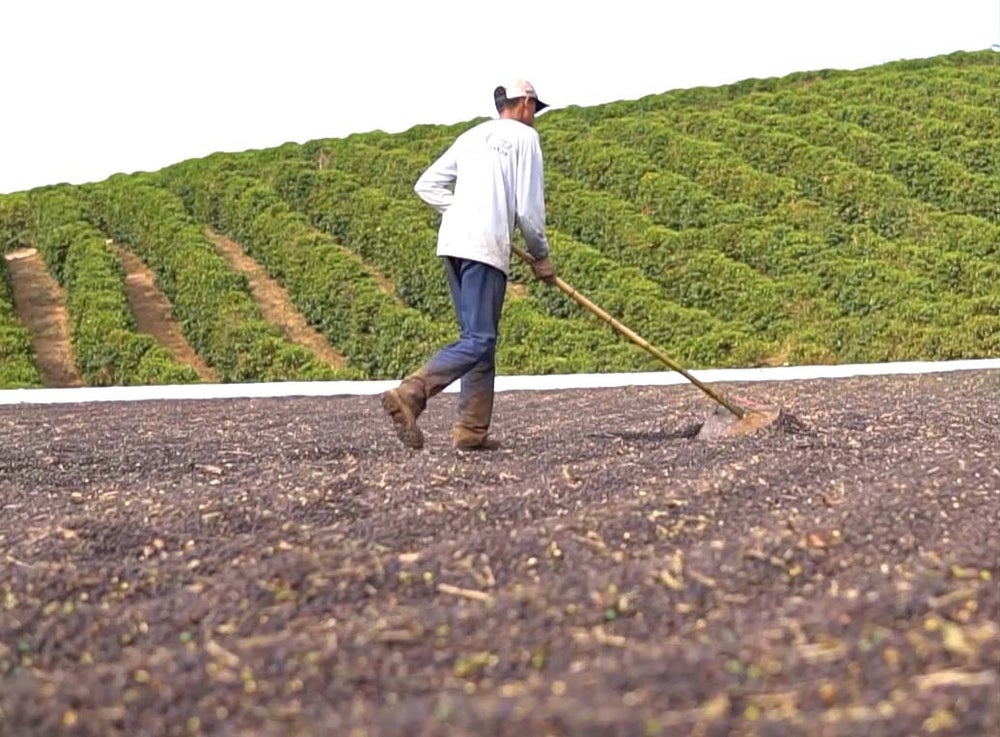From the Field
Monday, February 26, 2024
Everything You Need to Know About Brazil's Robusta Harvest
Brazil’s Robusta harvest is projected to begin in March. Our Field Research Coordinator recently toured Robusta farms in key producing regions and is here to share his insights with you.

From October to December, Brazil experienced below-average rainfall that impacted some Arabica & Robusta growing regions. However, “99% of Robusta coffee in Espirito Santo, Brazil’s largest Robusta producing state, is irrigated and most farmers elsewhere also had access to groundwater,” they say. “All the Robusta trees kept their flowers and fruit, and we expect good quality and high volumes this year.” The team estimates that the Robusta harvest in Espirito Santo will be around 4% higher than last year. Bahia and Rondônia regions are expected to be 10% and 15% lower, respectively. These reductions are occurring due to the high production of the previous cycle (23 /24). Our total robusta harvest in Brazil is 0.5% smaller compared to the previous cycle.
Insects and labor shortages, both of which can affect farmer profitability, seem to be kept in check, they say. “This year, there have been some cases of insect attacks (mainly mealybugs), but they have been on a small scale,” our team reports. Farmers are addressing insect attacks early and keeping them contained. “Attacks have been localized and we do not expect this to become a largescale issue. On the labor front, the team believes that Robusta farms should have all the labor they need this year. This is due to an increase in mechanical harvester use and a decrease in the size of the black pepper crop this year. Black pepper is another important crop in Esprito Santo and those farms can sometimes compete for labor with Robusta farms, they explain.
Sucafina’s responsible sourcing program, IMPACT, is being adopted by many Robusta producers in Brazil. So far, we have 196 producers with 247 Robusta farms that are IMPACT-verified. “We believe that socio-environmental education, transparent communication, and having the region's producers and partners involved in project proposals are what differentiate IMPACT for other standards,” says Mariana Martins, Sustainability Managers at Sucafina in Brazil. Suppliers can attend workshops, consult with Sucafina agronomists and access additional training.
IMPACT in Brazil is growing. In the conilon region, the number of producers linked to our sustainability program is expected to grow by 200%.
For farmers who are already verified, the team is supporting them and helping them meet additional continuous improvement indicators, on which farmers must meet progressively more criteria at each audit. To help farmers meet these indicators, Sucafina in Brazil provides farm visits and hosts workshops on strategies to improve or meet specific criteria.
In addition to connecting farmers to new markets, IMPACT verification is also improving sustainability in the supply chain by monitoring deforestation. Through IMPACT, Sucafina in Brazil collects GPS data on the size and shape of each farm. They are then able to overlay satellite data of forest cover and a forest change layer in order to track deforestation events.
Simultaneously, the Sucafina in Brazil team is engaged in other technologically-driven projects to support farmers and increase productivity. One impactful project is their collaboration with Agrosmart, a climate-smart agriculture platform. This platform utilizes devices to monitor the microclimate within production areas, providing farmers with actionable insights regarding weather conditions and field operations. By installing climate monitoring devices across all coffee-growing regions in Brazil, Sucafina in Brazil and Agrosmart can gain a deeper understanding of how climate conditions affect the harvest is a new weather monitoring project that uses state-of-the-art weather devices to record and transmit weather data. Sucafina is placing these climate monitoring devices in all the coffee growing regions in Brazil and these will enable Sucafina and Agrosmart to more accurately predict climate conditions. The platform sends data, alerts and insights to farmers about key agricultural factors such as rainfall, air temperature, strong winds and humidity levels. With this information, farmers can make more informed decisions about when to plant, fertilize, manage pests and diseases, and harvest crops, ultimately leading to more efficient and productive farming practices.
The team estimates that the harvest will begin in March and continue through June and July. Now is the time to start prebooking Brazilian Robusta crop. Don’t miss out! Get in touch with your trader today.